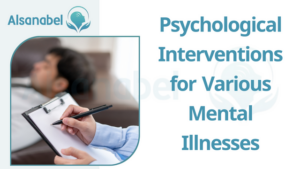The Benefits of Psychological Treatment for Mental Health 2024
- Category ADHD
Psychological treatment, also known as psychotherapy or talk therapy, is a form of treatment that addresses mental health concerns through various therapeutic techniques. These techniques aim to improve an individual’s emotional well-being and overall quality of life.
Advantages of Incorporating Psychological Treatment
There are numerous benefits to incorporating this treatment into mental health care. Here are some of them:
- Improved Symptom Management: It has been shown to help individuals better manage and cope with symptoms of mental illness. This can include reducing feelings of anxiety, depression, and stress.
- Enhanced Self-Awareness: Through psychotherapy, individuals can gain a better understanding of their thoughts, emotions, and behaviors. This can lead to increased self-awareness and improved decision-making skills.
- Improved Interpersonal Relationships: Psychotherapy can help individuals improve their communication skills and develop healthy relationships. This can include relationships with family members, significant others, and coworkers.
- Tailored Treatment: Unlike medication, this treatment can be tailored to the individual. This means treatment can be adjusted to meet the specific needs and goals of each person.
- Long-Term Benefits: This treatment can provide long-term benefits to individuals struggling with mental health concerns. By addressing underlying issues and learning coping skills, individuals can experience lasting improvements in their overall emotional well-being.
Psychological Interventions for Various Mental Illnesses
Psychological treatment can also be tailored to address specific mental health concerns. For example, individuals struggling with post-traumatic stress disorder (PTSD) may benefit from exposure therapy, which gradually exposes them to traumatic memories in a safe and controlled environment. Those with borderline personality disorder (BPD) may benefit from DBT, which teaches skills for managing intense emotions and interpersonal conflicts.

Overall, incorporating this treatment into mental health care can lead to significant improvements in symptom management and overall quality of life for individuals struggling with mental illness. By addressing the root causes of mental health concerns and teaching coping skills, psychological interventions provide a unique and effective approach to mental health care.
Emotional Intelligence
Psychological interventions can teach individuals how to identify and regulate their emotions, which is a critical aspect of emotional intelligence. By learning how to observe and understand their emotions, individuals can develop more effective communication skills and better manage their relationships. Techniques such as mindfulness-based interventions and emotion-focused therapy can enhance emotional intelligence by teaching individuals to recognize their feelings without immediately reacting to them.
Enhancing Resilience
Resilience refers to an individual’s ability to bounce back from adversity. This treatment can enhance resilience by teaching individuals coping skills that they can use in challenging situations. By learning how to identify negative thinking patterns, develop problem-solving skills, and engage in self-care activities, individuals can improve their ability to cope with difficult circumstances. Cognitive-behavioral therapy is a popular technique used to enhance resilience and teach individuals how to challenge negative beliefs that may be holding them back.
Overall, incorporating this treatment into mental health care can have a significant impact on an individual’s emotional intelligence and resilience, in addition to symptom management. By providing individuals with the tools to manage their emotions and cope with adversity, psychological interventions can help them lead a more fulfilling life.
Psychological treatment can also enhance an individual’s self-awareness and self-esteem. By understanding their strengths, weaknesses, and values, individuals can better understand themselves and their place in the world, leading to a greater sense of purpose and direction.
One way this treatment can enhance self-awareness is through introspective techniques such as journaling and self-reflection. It allows individuals to explore their thoughts and feelings, identify patterns in their behavior, and make connections between their past experiences and current issues.
Low self-esteem is a common emotional difficulty experienced by many individuals with mental illness. Psychological treatment can help individuals improve their self-esteem by identifying negative self-beliefs and replacing them with more positive attitudes. Cognitive-behavioral therapy, solution-focused therapy, and narrative therapy are some of the interventions that may be used to address low self-esteem.
Encouraging Healthy Coping Strategies
Coping strategies are the behaviors and thought processes individuals use to manage stress, anxiety, and other difficult emotions. In this treatment, encouraging healthy coping strategies is an important component of improving mental well-being.
Coping Strategies in Psychological Treatment
One of the primary goals of psychological treatment is to help individuals develop effective coping strategies. Cognitive-behavioral therapy (CBT) and dialectical behavior therapy (DBT) are two well-established treatments that focus on teaching individuals skills to manage difficult emotions and behaviors.
CBT helps individuals identify negative thought patterns and develop new, more positive ways of thinking. This can be particularly helpful for individuals with anxiety disorders, who often experience negative thoughts that trigger their anxiety symptoms. By changing their thought patterns, individuals can reduce their anxiety and improve their overall well-being.
DBT is specifically designed for individuals who struggle with intense emotions, impulsive behaviors, and relationship problems. It combines elements of CBT with mindfulness and interpersonal effectiveness skills, helping individuals regulate their emotions and manage interpersonal conflicts.
Effective Strategies for Coping with Stress and Anxiety
In addition to specific therapeutic interventions, individuals can also benefit from learning healthy coping strategies to manage stress and anxiety outside of therapy. These strategies can include:
- Deep breathing exercises: Deep breathing can help individuals reduce stress and relax their bodies.
- Exercise: Regular exercise is a great way to manage stress and anxiety, as it releases endorphins that boost mood and promote relaxation.
- Mindfulness meditation: Mindfulness meditation is a technique that involves focusing on the present moment and accepting one’s thoughts and feelings without judgment. It can help individuals manage stress and anxiety by teaching them to stay in the present moment and let go of worries about the future.
Strengthening Relationships and Communication
Communication plays a critical role in human relationships, whether it be with family members, friends, or romantic partners. However, conflicts and misunderstandings can arise, leading to strained relationships. This is where psychological treatment can be helpful.

Communication in Psychological Treatment
Psychological treatment often involves an emphasis on improving communication skills. Improving communication involves not only speaking clearly but also actively listening to others. Communication exercises can include learning how to express emotions more effectively, active listening, and problem-solving skills. Additionally, therapy can help individuals identify patterns in their communication that may be contributing to conflict and teach them healthier communication strategies.
Improving Relationships
Psychological treatment can also aid in improving family dynamics, friendships, and romantic relationships. Family therapy, for example, can help improve parent and child relationships by opening up channels of communication, addressing issues related to family values, and building trust. Coupled with the development of communication skills, couples therapy can be helpful in strengthening and improving romantic relationships by working on issues such as trust and intimacy.
Personal Growth and Self-Discovery
Psychological Treatment and Personal Growth
Aside from strengthening relationships and communication, psychological treatment can aid in personal growth and self-discovery. Therapy can help individuals gain a better understanding of their emotions, behaviors, and thoughts. In doing so, they can develop a stronger sense of self-awareness and learn how to make positive changes in their lives.
Psychotherapy and counseling can explore past traumas or difficult life transitions that may be contributing to current emotional distress. This process can help individuals gain insight into their behaviors and beliefs, which can ultimately lead to healthier coping mechanisms and habits. Additionally, therapy can assist individuals in setting goals, addressing self-defeating thoughts, and building self-esteem.
Self-Discovery for Emotional and Mental Well-being
Self-discovery is a vital component of emotional and mental well-being. By gaining a better understanding of oneself, individuals can work towards living a more fulfilling life both personally and professionally. Therapy can help individuals develop self-awareness and build a sense of purpose and meaning in their daily lives.

The process of self-discovery involves exploring one’s identity and understanding how past experiences may have impacted their beliefs and behaviors. In therapy, individuals can learn how to identify and address negative thought patterns and behaviors that may be holding them back from achieving personal growth.
In conclusion, personal growth and self-discovery are essential elements of psychological treatment. Through exploration and self-awareness, individuals can achieve emotional and mental well-being, leading to a more fulfilling life.
The Importance of Psychological Treatment Support
Having a strong support system is crucial to achieving positive results in psychological treatment. Support from friends and family can provide a sense of comfort and stability, while group therapy can offer a community of individuals who are experiencing similar struggles. Taking part in group therapy can help individuals feel less alone and more accepted, which can be very beneficial in the healing process.
Many therapists also offer support and guidance outside of therapy sessions through phone calls or emails. This extra level of support can help individuals feel more connected and supported during times of distress or crisis.
Finding Encouragement in Psychological Treatment Journey
The journey of psychological treatment can be challenging, but it can also be a time of great growth and self-discovery. It is not uncommon to experience periods of frustration or setbacks along the way, but it is important to stay committed to the process.
Remembering why therapy was started in the first place is crucial when encountering obstacles. Keeping goals in mind and focusing on progress can be incredibly encouraging. Celebrating even small successes along the way can help motivate individuals to keep moving forward.
It is also important to communicate with a therapist and express any concerns or questions. Open and honest communication can lead to more productive and beneficial therapy sessions.
In conclusion, finding support and encouragement during psychological treatment can make the journey less daunting and more rewarding. Trusting the process, staying committed, and celebrating progress can help individuals achieve the emotional and mental well-being they deserve.









